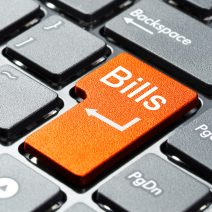Help with bills and one off costs
Budgeting loans and budgeting advances.
These are interest free loans from the DWP to help you pay for essentials such as furniture, clothing, removal expenses, expenses to help you start or prepare for work. If you have already bought the item on hire purchase or credit you can ask for a budgeting loan to repay this.
You can apply for a budgeting loan if you are currently getting and have been receiving Income Support or Income Based JSA or Income Related Employment and Support Allowance or Pension Credit for at least 26 weeks. You will normally have to repay the loan from future benefits over a period of 104 weeks.
To apply, get form SF500 from your local Jobcentre Plus or download it from gov.uk. It is important to explain your circumstances and why you need it.
You can apply for a budgeting advance if you are currently getting Universal Credit and have been receiving Universal Credit for 6 months – although time claiming Income Support or Income Based JSA or Income Related Employment and Support Allowance will count towards the 6 months*. You also have to have earned in total less than £2600 (single claimants) or £3600 (couples) in this 6 month period, and be able to show you can afford to repay it. You normally have to repay the loan, out of your Universal Credit, over 12 months.
*It can be less than this if the loan is needed for a necessary item for employment.
Contact your work coach at the Jobcentre to apply.
Flexible Support Fund
If you are looking for work, or you are expected to do some work related activity or work preparation, you may be able to get some help from the Flexible Support Fund towards the extra costs connected with these activities including upfront childcare costs. This could be things like travel costs or child care costs to enable you to attend a job interview or training that will improve your chances of getting work, or suitable clothing to attend job interviews. Your work coach at the Jobcentre has access to this fund, so let him/her know if you need extra financial support with this type of cost.
Food Banks
If you find that you and/or your family cannot afford to eat, perhaps because your benefits have been sanctioned or delayed, you can ask us about getting help, contact the Financial Inclusion Team on 0300 111 000 or 0800 633 5500. Or you may be able to be referred by a doctor, health visitor, social worker, or advice agency.
The food banks usually supply an emergency food parcel to last a few days. At some food banks volunteers are on hand to talk to families over a cup of tea or free hot meal and are able to signpost people to agencies able to solve the longer-term problem.
Many food banks are run by the Trussell Trust – you can check on-line where your nearest food bank can be found (www.trusselltrust.org/map), or phone them on tel: 01722 580 180.
Gas and Electricity
Gas and electricity prices keep rising and now present a large chunk of the household budget but there are ways to minimise this expense.
Check to see:
- If changing supplier would reduce your bills. Go to www.uswitch.com or to www.moneysavingexpert.com/utilities/you-switch-gas-electricity.
- If changing the way you pay your bill could help. Contact your gas / electricity supplier.
- If you are in gas and /or electricity arrears see if your supplier has a charitable trust that could help.
- If you qualify for the £140 Warm Home Discount for the months between October and March. Go to: www.gov.uk/the-warm-home-discount-scheme/what-youll-get.
- If you or your partner qualify for a Winter Fuel Payment. Go to: www.gov.uk/winter-fuel-payment/overview.
Water bills
There are several different schemes available to help people with the cost of their water bills and any arrears. Whether you can reduce your water bill will depend on whether you have a water meter or pay water rates, and may depend on your income.
If you pay your water by way of a water meter you should:
- Check to see if you qualify for the WaterSure scheme. Go to here: www.ofwat.gov.uk/households/your-water-bill/watersure/ or contact your water supplier.
- If you are a low water user, check to see if your supplier has any special tariffs that you could qualify for.
Ensure you are using all the water savings products that are available for free. Please contact the Financial Inclusion Team on 0300 111 000 or 0800 633 5500 for more information.
If you pay water rates you should:
- Check to see if it would be cheaper for you to have a water meter fitted – but you need to speak to us first.
If you are in arrears with you water bill you should:
- See if your supplier has a restart scheme or similar.
The WaterSure scheme
If you or someone in your household receives certain benefits or tax credits and you live in a property with a water meter, there are government regulations to protect you.
To qualify for WaterSure you must have either:
- At least three or more children up to 19 years old in full time education who live with you, and for whom you claim Child Benefit, or
- Someone in your household who has a medical condition which means they use a lot of water.
If this applies to you, you do not have to pay more than the average bill for domestic customers on a water meter and could save money. Check on this website for the average in your area: www.selectra.co.uk/water/guides/watersure-scheme.
Local Welfare Provision Scheme.
The Welfare Provision Scheme is a discretionary scheme for Manchester residents with eligible needs and provides:
- a safety net in a disaster or emergency, including in some circumstances, help towards fuel, food and other living expenses,
- help to some vulnerable people to set up a new home by the provision of goods and furniture,
- practical support to enable independent living in the community.
The fund is available to people who do not have alternative means of paying for what they need. The scheme intends to meet one off needs rather than ongoing expenses.
Please note that the fund is not generally able to support households that are experiencing emergency hardship due to a DWP sanction, as these households should contact the DWP for support. See here for further details and how to claim www.manchester.gov.uk/info/200008/benefits_and_support/6301/get_essential_items_of_furniture.
© 2019 Housing Systems Ltd

